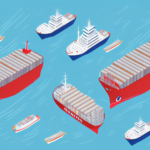Maximizing Efficiency with Air Freight for E-Commerce Logistics
In today's globalized world, e-commerce has become an integral part of our lives. With its rapid growth, logistics has emerged as a crucial aspect of business operations. Efficiently shipping goods from one location to another is paramount for the success of any e-commerce venture. Among various logistics options, air freight stands out as the optimal choice.
Benefits of Air Freight for E-Commerce Businesses
Speed and Reliability
Air freight is the fastest mode of transportation for goods, offering unparalleled speed, reliability, and safety. According to the International Air Transport Association (IATA), air cargo demand has consistently grown, emphasizing its importance in global commerce. For e-commerce businesses, reducing delivery times is essential to meet customer expectations and maintain a competitive edge.
Flexibility in Shipping Schedules and Routes
Beyond speed, air freight provides flexibility in shipping schedules and routes, allowing businesses to adapt to fluctuating demands or unexpected events swiftly. This adaptability ensures that e-commerce businesses can respond promptly to customer needs, enhancing overall satisfaction. Additionally, air freight accommodates a wide range of products, from small parcels to large, bulky items, making it a versatile option for diverse inventory needs.
Real-Time Shipment Tracking
Real-time shipment tracking is a significant advantage of air freight. Businesses can monitor their shipments through advanced tracking systems, keeping customers informed about their order status and fostering trust and loyalty. According to a report by Forbes Technology Council, enhanced tracking capabilities have led to a 25% increase in customer satisfaction rates among e-commerce businesses.
Cost Efficiency of Air Freight
Long-Term Savings
While air freight is often perceived as a costly option, it can lead to long-term savings by reducing inventory and storage costs. By shipping smaller, more frequent batches, businesses can minimize the need for extensive warehousing, leading to significant cost reductions.
Reduction in Product Damage
Air freight reduces the risk of damage during transportation, which lowers the expenses associated with replacing or repairing damaged goods. A study by the Statista indicates that businesses using air freight experienced a 20% decrease in product damage claims compared to other shipping methods.
Competitive Delivery Options
The rapid delivery capabilities of air freight support businesses in offering competitive delivery options like same-day or next-day shipping, which can attract more customers and increase sales. Additionally, the ability to reach remote or hard-to-access areas expands the customer base, opening new revenue streams for e-commerce businesses.
Choosing the Right Air Freight Service
Evaluate Cost and Value
- Pricing Structures: Compare pricing structures and services offered by different air freight providers to ensure you receive the best value for your investment.
- Service Options: Assess whether providers offer express, standard, and deferred shipping options to match your business needs.
Assess Reliability and Safety
- Track Record: Choose providers with a proven track record of reliability and adherence to safety protocols to minimize risks.
- Safety Certifications: Ensure the provider holds necessary safety certifications and complies with international shipping standards.
Check Service Provider Reputation
- Customer Reviews: Research customer reviews and industry ratings to gauge the reputation of potential air freight partners.
- Industry Recognition: Look for providers recognized by industry bodies and awards for excellence in service.
Consider Specialization
- Product Handling: Select a provider that specializes in handling the specific types of goods you ship, ensuring proper handling and compliance.
- Industry Focus: Providers with experience in your industry can offer tailored solutions that meet your unique logistics requirements.
Verify Compliance and Certifications
- Permits: Ensure that the air freight service has the necessary permits and certifications to transport your goods to desired destinations.
- Regulatory Adherence: Confirm that the provider adheres to international and local shipping regulations to prevent legal complications.
Overcoming Challenges in Air Freight Logistics
Transparent Pricing
- Clear Pricing Structures: Work with service providers who offer clear and detailed pricing structures to avoid unexpected costs.
- Cost Breakdown: Request a detailed cost breakdown to understand all potential expenses involved in shipping.
Customs Compliance
- Regulation Awareness: Stay informed about customs regulations and maintain open communication with your freight provider to expedite clearance processes.
- Documentation: Ensure all necessary documentation is complete and accurate to prevent delays or penalties.
Risk Management
- Appropriate Packaging: Invest in appropriate packaging to protect high-value or fragile items during transit.
- Insurance: Obtain comprehensive insurance coverage to safeguard against potential losses or damages.
Managing Rate Fluctuations
- Rate Stabilization: Partner with freight forwarders who offer rate stabilization and provide insights into market trends to manage cost volatility.
- Flexible Contracts: Negotiate flexible contracts that allow adjustments based on market conditions.
The Role of Technology in Air Freight Efficiency
Advanced Tracking Systems
Technology has revolutionized air freight operations, enhancing efficiency and visibility. GPS-enabled tracking systems allow businesses to monitor shipments in real-time, facilitating timely interventions if issues arise.
Data Analytics and AI
Data analytics tools help optimize supply chains by identifying bottlenecks and predicting demand patterns. Innovations like artificial intelligence (AI) are streamlining air freight processes, from automated sorting and handling to predictive maintenance of aircraft, thereby reducing downtime and increasing reliability.
Emerging Technologies
Innovations such as drones have the potential to further transform the industry by providing faster and more cost-effective delivery options, especially in remote or hard-to-reach areas. However, regulatory and safety considerations must be addressed before widespread adoption.
Future Trends in Air Freight for E-Commerce
Autonomous Aircraft
The development of autonomous aircraft is set to enhance efficiency and reduce operational costs in air freight. These aircraft can operate with minimal human intervention, increasing delivery speeds and reducing the likelihood of human error.
Blockchain for Transparency
Blockchain technology is being integrated into air freight logistics to enhance transparency and security. By providing a decentralized and immutable ledger, blockchain ensures that all parties have access to accurate and tamper-proof shipment data, reducing fraud and improving trust among stakeholders.
Sustainable Fuel Options
As environmental concerns grow, the adoption of sustainable fuel options in air freight is becoming increasingly important. Airlines and logistics providers are investing in biofuels and other eco-friendly alternatives to reduce carbon emissions and promote sustainability within the industry.
Integration of AI and Machine Learning
The integration of artificial intelligence and machine learning will further optimize logistics operations, enabling predictive analytics for demand forecasting and inventory management. These technologies can analyze vast amounts of data to identify trends and make informed decisions, enhancing overall efficiency and reducing costs.
Best Practices for Managing E-Commerce Logistics with Air Freight
- Optimize Packaging: Use packaging that reduces space and weight without compromising the safety of the goods, lowering shipping costs.
- Consolidate Shipments: Combine smaller shipments into larger ones to achieve cost savings through bulk transportation.
- Partner with Trusted Providers: Collaborate with reputable air freight service providers to ensure reliable and efficient shipping.
- Regular Process Reviews: Continuously evaluate and refine logistics processes to identify areas for improvement and enhance overall efficiency.
- Clear Communication: Maintain transparent communication with your service provider, ensuring accurate shipment information and setting clear delivery expectations.
Understanding Customs Regulations and Compliance
Customs regulations vary by country and can be complex. To ensure smooth shipping processes:
- Stay Informed: Keep abreast of the latest customs regulations and changes that may affect your shipments by consulting resources like the U.S. Customs and Border Protection.
- Work with Experts: Collaborate with knowledgeable air freight service providers and customs brokers who can navigate compliance requirements.
- Accurate Documentation: Ensure all shipment documents are complete and accurate to prevent delays or penalties.
- Product-Specific Regulations: Research and comply with regulations specific to certain products, such as electronics or food items.
Non-compliance can lead to severe consequences, including fines and seizure of goods. A report by Trade.gov highlights that businesses that prioritize customs compliance experience 30% fewer shipment delays.
Enhancing Customer Satisfaction through Effective Shipment Management
Effective shipment tracking is vital for maintaining high levels of customer satisfaction. Implementing advanced tracking systems allows businesses to provide customers with real-time updates on their orders, enhancing transparency and trust.
- Real-Time Tracking: Utilize GPS and RFID technologies to monitor shipments continuously, enabling proactive issue resolution.
- Customer Notifications: Automatically notify customers about their shipment status through emails or SMS, keeping them informed at every stage.
- Secure Handling: Ensure shipments are handled securely to prevent loss or damage, reinforcing customer confidence in your delivery process.
The speed and security of air freight not only reduce delivery times but also minimize the risk of lost or damaged goods. This reliability is crucial for businesses that offer time-sensitive products or operate within tight delivery windows.
The Future of Air Freight in the E-Commerce Industry
The future of air freight in the e-commerce sector is promising, driven by technological advancements and the continual growth of online shopping. Innovations such as autonomous aircraft, blockchain for enhanced transparency, and sustainable fuel options are set to make air freight more efficient, cost-effective, and environmentally friendly.
E-commerce businesses that leverage these advancements will benefit from faster delivery times, reduced operational costs, and improved sustainability practices. Additionally, the integration of artificial intelligence and machine learning will further optimize logistics operations, enabling predictive analytics for demand forecasting and inventory management.
In conclusion, air freight remains the most efficient and reliable mode of transportation for e-commerce logistics. By reducing delivery times, enhancing customer satisfaction, and providing the flexibility needed to navigate a dynamic market, air freight is indispensable for the success of e-commerce businesses. Partnering with the right service providers, understanding regulatory requirements, and embracing technological innovations will enable businesses to maximize efficiency and thrive in the competitive global marketplace.






















